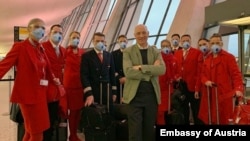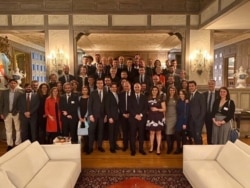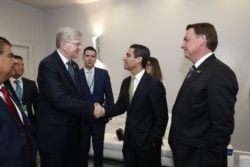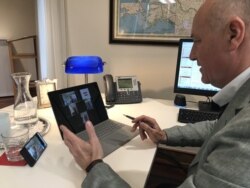Like so many U.S. businesses and institutions, foreign embassies in Washington have adjusted to the coronavirus by embracing online conferencing apps and teleworking. Uniquely, however, most are preoccupied with the challenges of getting their compatriots safely home.
“Our embassy team has been reduced to the bare minimum – almost all of us work from home,” said Austrian Ambassador Martin Weiss. Like others interviewed for this article, he was interviewed online to avoid person-to-person contact.
“Our meetings are now done by Zoom videoconference, which works amazingly well,” Weiss explained. “That´s a new skill we all have learned quickly, we will continue to use this well after the time after corona. As they say, ‘every crisis is an opportunity!’”
Weiss’ Italian counterpart, Armando Varricchio, said his entire staff is now teleworking, in accordance with city and national guidelines to slow the spread of the coronavirus by reducing opportunities for it to spread from person to person.
“The virus has forced us to adapt the way we work,” Varricchio said. “I, for one, had to start making intense use of videoconferencing apps” and getting used to virtual discussions.
“We have adapted swiftly to this new reality while continuing to be at the service of the Italian citizens,” the ambassador added.
Whether or not to telework was not an option for Brazil's chargé d'affaires, Nestor Forster Jr., who learned on the evening of March 13 he had tested positive for COVID-19.
Even before getting the test result, Forster had placed himself in self-quarantine upon learning the virus had been detected in a member of a Brazilian delegation led by President Jair M. Bolsonaro for a meeting with U.S. President Donald Trump at Mar-a-Lago, Florida.
“This is a very important time for diplomacy, as we are called to do what only we can do,” Forster said in a written statement from his place of isolation.
He said his embassy is “helping the Brazilian government to understand and compare measures being adopted in the U.S.” with those being adopted at home. At the same time, he said, the mission is “establishing the relevant Brazil-U.S. private and governmental networks that are playing a part in the response.”
Aides at the embassy told VOA the delegation “is still working at full speed, but it is operating with minimum physical presence and personal contact. Logistically, this means as much remote work as possible, with videoconferencing services now the norm for all our meetings and presentations.”
“On a positive note,” a spokesman added, “the measures appear to be working; so far no other person at an embassy with almost 120 people on its staff has tested positive or shown symptoms for COVID-19.”
Austria’s Weiss, who arrived in Washington just months before the virus struck, said he is coping well with the widespread “stay-at-home” orders that are keeping most Americans off the streets.
“I live in a house and have a garden,” he explained, noting he is getting ample opportunities to walk the family dog Paco, who “was rescued by a Catholic priest from the streets of Sarajevo and brought to Vienna where we took him in. Paco is Spanish for Francisco – the priest was a Franciscan.”
This past week, one of Weiss’s main duties was to ensure 300 Austrian citizens were able to board an Austrian Airlines flight headed for home.
“Many were just tourists, ready to cut their trips short, others worked in hotels and restaurants and had simply lost their jobs,” Weiss explained. There also were a number of students whose host high schools and universities have been closed indefinitely.
“Many of them felt that they were better off in Austria. There they have family, there they are familiar with the health care system, etc. Plus, many Austrians have the feeling that our government does a very good job in this crisis,” he said.
The Italian emissary, Varricchio, said he also considers support for his fellow citizens to be a top priority.
“At the very beginning of the crisis, we set up a task force at the embassy,” he said, adding that the task force has relied upon a “vast consular network” to ensure delivery of “effective and rapid assistance to all our citizens in need.”
Varricchio and his staff have talked in recent days to exchange students, passengers of cruise ships, people whose flights had been canceled, “and many other who quite simply wanted to hear a comforting voice.”
Because of the coronavirus, Varrichio added, “We will all be asked to make some sacrifices, to change our way of life, and adapt to a different world. This will be a significant challenge for all of us, no matter where we come from.
“The war against this virus starts with each and every one of us,” he said. The world we knew will change “in ways we would have not been able to fathom just a few months ago. We all need to be prepared.”










